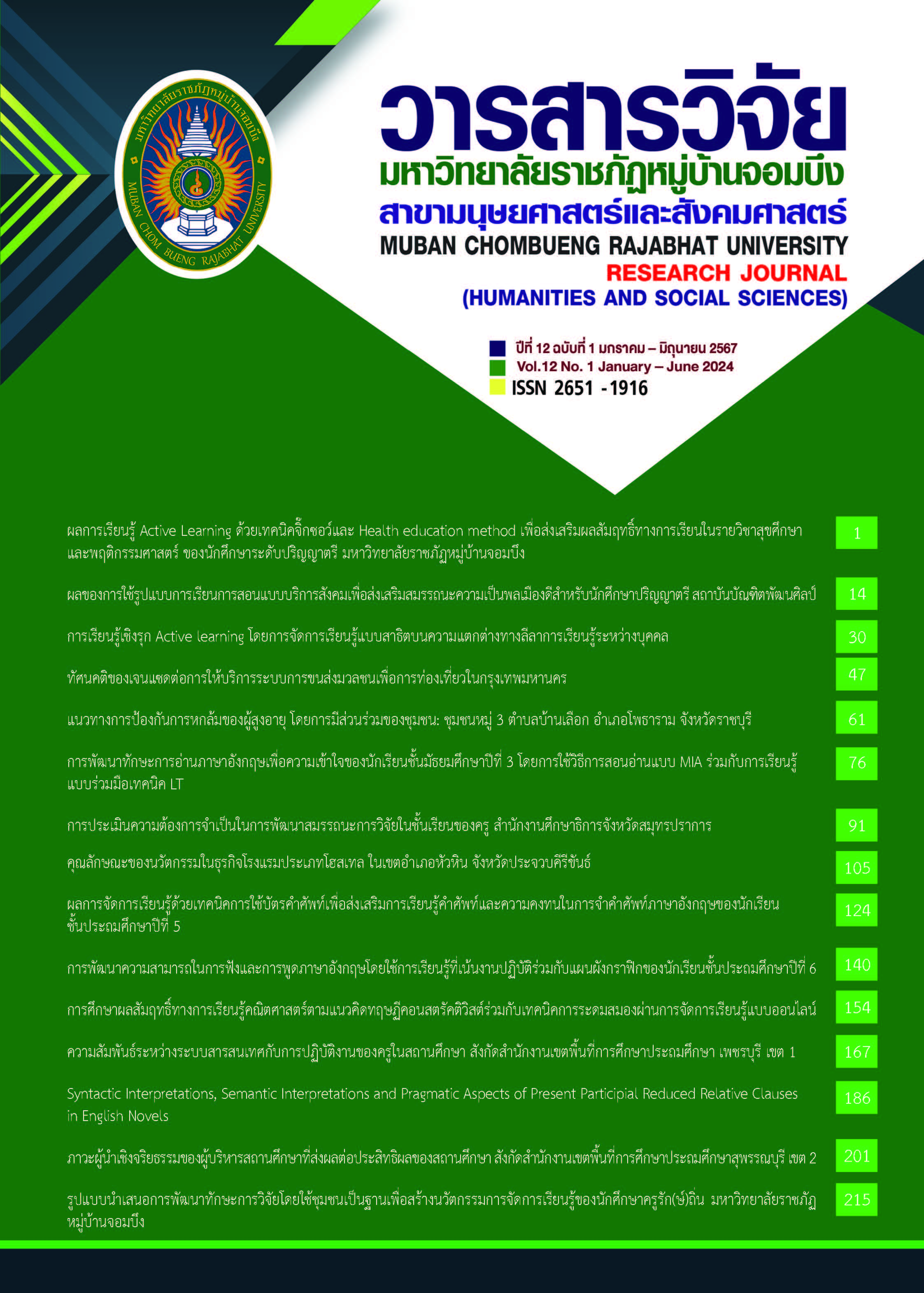การตีความวากยสัมพันธ์ การตีความเชิงอรรถศาสตร์และด้านวัจนปฎิบัติศาสตร์ ของคุณานุประโยคที่ถูกลดรูปในนวนิยาย
คำสำคัญ:
การตีความวากยสัมพันธ์, การตีความเชิงอรรถศาสตร์, ด้านวัจนปฎิบัติศาสตร์, คุณานุประโยคที่ถูกลดรูป, นวนิยายบทคัดย่อ
งานวิจัยครั้งนี้ศึกษาการตีความวากยสัมพันธ์ การตีความเชิงอรรถศาสตร์และวัจนปฎิบัติศาสตร์ของโครงสร้างคุณานุประโยคที่ถูกลดรูปในนวนิยายที่เขียนเป็นภาษาอังกฤษ ในขณะที่งานวิจัยที่ศึกษาโครงสร้างคุณานุประโยคที่ถูกลดรูปก่อนหน้านี้ให้ความสำคัญกับตัวบทงานเขียนของนักศึกษาที่เรียนภาษาอังกฤษเป็นภาษาต่างประเทศ คลังข้อมูลภาษานานาชาติและตัวบทวิชาการ งานนี้จึงเลือกตัวบทที่แตกต่างคือนิยายภาษาอังกฤษ ชุดข้อมูลเก็บรวบรวมโดยวิธีการสุ่มแบบเจาะจงจากนวนิยายขายดีเป็นจำนวนทั้งสิ้นสามเล่มเพื่อการเก็บข้อมูลโครงสร้างคุณานุประโยคที่ถูกลดรูป งานวิจัยครั้งนี้เก็บรวบรวม
จากนวนวนิยายที่มีผู้เขียนเป็นชาวอเมริกันจำนวนทั้งสิ้นสามเล่มได้แก่ The Lottery (Jackson, 2015), The Turn of the Screw (James, 2021) และ On the road (Kerouac, 2022) ชุดข้อมูลประมาณ 300,000 คำประกอบด้วย 20 ตัวอย่างประโยค ทฤษฏีวากยสัมพันธ์อธิบายตามหลักการของ Radford (2009) การตีความเชิงอรรถศาสตร์ทำตามแบบของ Kearns (2011) เพื่อให้การวิเคราะห์ข้อมูลเป็นไปอย่างถูกต้องและน่าเชื่อถือ นักภาษาศาสตร์จำนวนทั้งสิ้นสามท่านดำเนินการการตรวจสอบการวิเคราะห์ข้อมูล ผลการศึกษาแสดงให้เห็นว่าจำนวนความถี่ที่ต่ำของโครงสร้างคุณานุประโยคที่ถูกลดรูปในนวนิยายที่เขียนเป็นภาษาอังกฤษอธิบายได้โดยหลักการความซับซ้อน การตีความเชิงอรรถศาสตร์ของคุณานุประโยคที่ถูกลดรูปในนวนิยายที่เขียนเป็นภาษาอังกฤษสามารถอธิบายได้โดยกิจกรรมทั่วไป ในด้านวัจนปฎิบัติศาสตร์ โครงสร้างคุณานุประโยคที่ถูกลดรูปส่วนใหญ่เกิดขึ้นที่ท้ายประโยคเพื่อให้ข้อมูลเพิ่มเติม นักวิจัยหวังเป็นอย่างยิ่งว่างานวิจัยครั้งนี้จะเป็นประโยชน์ต่อผู้เรียนภาษาอังกฤษเป็นภาษาต่างประเทศ และผู้เรียนภาษาอังกฤษเป็นภาษาที่สองแง่มุมการใช้โครงสร้างคุณานุประโยคที่ถูกลดรูปในการเขียรเรื่องสั้นและนวนิยายภาษาอังกฤษ
เอกสารอ้างอิง
Al-Momani, M. M. A. (2019). A study on the function of the English participial phrases. US-China Foreign Language, 17(2), 1-6.
Anastasova, M. (2017). A contrastive analysis of the English past participle and the Bulgarian past Participle. Language and Literature, 55(1). 136-146
Basetlíková, J. (2012). Present participle in the English and Czech fiction. Retrieved on October 22, 2022 from https://dk.upce.cz/bitstream/handle/10195/45759/Basetl%C3%ADkov%C3%A1J_Presentparticiple_LH_2012.pdf.pdf?sequence=3&isAllowed=y
Childs, L. G. (1997). Present Participle Adjuncts in the Book of Mormon. Journal of Book of Mormon Studies, 6(1), 24-38.
Jackson, H. (2015). The lottery. UK: Penguin Random House.
James, H. (2021). The turn of the screw. UK: Penguin Random House.
Haryani, E., & Fatimah, S. (2020). An analysis of English language and literature department students’ ability in constructing adjective clause in essay
writing. Journal of English Language Teaching, 9(1), 119-128.
Haryanti, S., Haryono, P., & Yuwono, S. E. (2022). English students’ and lecturers’
difficulties in teaching and learning of participle phrases. International Journal of Active Learning, 7(1), 24-34.
Hashemi, M. (2011). Language stress and anxiety among the English language learners. Procedia-Social and Behavioral Sciences, 30, 1811-1816.
Ismani, Z. A. B., & Simamora, S. (2021). The difficulties facing by students in using
participle in sentences. Cendikia: Media Jurnal Ilmiah Pendidikan, 11(2), 97-111.
Itokawa, T. (2014). The Grammatical Meanings of the Adjectival Participle in English1. Lexicon, 44, 73-85.
Kadiatmaja, A. P. (2022). Teaching the past participle through drilling technique. Jurnal Al-Fawa'id: Jurnal Agama dan Bahasa, 12(1), 38-50
Katami, A. (2005). Investigation on the present participial construction in the
language of a revelation of Love. Bulletin of Saitama Gakuen University. Faculty of Management, 5, 163-176.
Kearns, K. (2017). Semantics. London: Bloomsbury Publishing.
Kerouac, J. (2022). On the road. UK: Penguin Random House.
Krave, M. F. (2012). The English -ing participial adjuncts in first and second language written discourse. Discourse and Interaction, 5(2), 17-34.
Lightbown, P. M., & Spada, N. (2021). How languages are learned 5th edition. Oxford: Oxford University Press.
Noviani, N. & Oktavia, W. (2021). Reducing adjective clauses into participial phrases: How good are the students. Journal of EnglishLanguage Teaching, 10(4), 599-607.
Radford, A. (2009). Introduction to English sentence structure. Cambridge: Cambridge University Press.
Reilly, N. (2013). A comparative analysis of present and past participial adjectives
and their collocations in the Corpus of Contemporary American English (COCA). Retrieved on October 14, 2022from https://stars.library.ucf.edu/cgi/viewcontent.cgi?article=3782&context=etd
Škodová, K. (2013). Finite and participial postmodifiers in spoken academic discourse: natural and social Sciences. Dissertation. Retrieved on October 11,
Sonoda, K. (1996). Commas and Participle (or Adjective) Phrases. Practical English Studies, 1996(4), 1-9.
Swan, M. (2016). Practical English Usage. Oxford: Oxford University Press.
Thiamtawan, S., & Pongpairoj, N. (2013). Avoidance of the use of English participial
reduced relative clauses among L1 Thai learners. LEARN Journal: Language Education and Acquisition Research Network, 6(2), 12-34.
Wongkittiporn, A., & Chitrakara, N. (2018). Control constructions in British and American English. Bullentin of the Transilvania University of Brasov, 11(2), 19-48.
ดาวน์โหลด
เผยแพร่แล้ว
รูปแบบการอ้างอิง
ฉบับ
ประเภทบทความ
สัญญาอนุญาต
ลิขสิทธิ์ (c) 2024 วารสารวิจัยมหาวิทยาลัยราชภัฏหมู่บ้านจอมบึง สาขามนุษยศาสตร์และสังคมศาสตร์

อนุญาตภายใต้เงื่อนไข Creative Commons Attribution-NonCommercial-NoDerivatives 4.0 International License.
วารสาร TCI อยู่ภายใต้การอนุญาต Creative Commons Attribution-NonCommercial-NoDerivatives 4.0 International (CC BY-NC-ND 4.0) เว้นแต่จะรุบุไว้เป็นอย่างอื่นโปรดอ่านหน้านโยบายของเราสำหรับข้อมูลเพิ่มเติมเกี่ยวกับการเช้าถึงแบบเปิด ลิขสิทธิ์ และการอนุญาต



